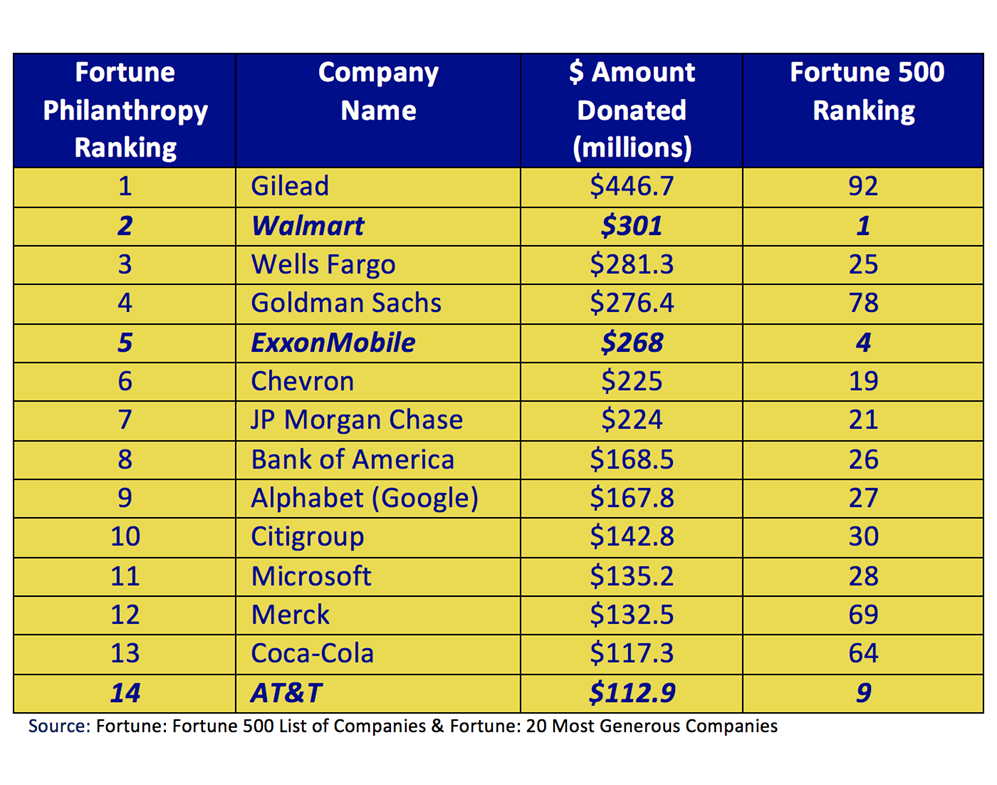Millennial Impact on Corporate Philanthropy
Posted on
April 26, 2018
Corporate philanthropy, the practice of corporations donating money to charitable causes, is technically on the decline. While the total dollar amount has increased some 115% over the past 30 years, as a percentage of pre-tax profits, corporate philanthropy numbers are dismal. According to Ken Stern in his article entitled, “Why Don’t Corporations Give to Charities,” published by MoneyBox, corporate giving has dropped over the past 30 years. In 1986 corporations gave 2.1% of their pretax profits, and as of 2012 that number had dropped to 0.8%.
One might naturally assume that the largest companies, say the top 10 or 12 on the Fortune 500 list would give the most philanthropic dollars. Well, that is not the case. In fact, only three of the top 12 Fortune 500 companies made the top 12 list of most charitable companies. According to Fortune, the following companies top the charitable giving list:

So Fortune 500 top companies such as Berkshire Hathaway, Apple, McKesson, United Health Group, CVS, General Motors, and Ford – who are in the top 10 of the Fortune 500, are not among the top givers. This doesn’t mean that they give nothing – that is far from the truth. They support education, HIV/AIDS, entrepreneurship, economic opportunities and workforce education, hunger, community development, and much more. CVS Caremark might even argue that their decision to stop selling tobacco products, a decision that cost the company in excess of $2Bn according to Helen Boone, SVP of Corporate Social Responsibility & Philanthropy at CVS Caremark, had a huge impact on health in this country and was a form of social responsibility, which is clearly tied to corporate philanthropy. However, there has been this trend to give a smaller percentage of pre-tax profits.
Stern argues that there are three reasons why the corporate giants are not among the most philanthropic (on a percentage basis). First, there is debate whether companies should be donating monies to nonprofit organizations. He quotes Milton Friedman as saying, “There is one and only one social responsibility of business – to use its resources and engage in activities designed to increase its profits.” For the second reason, Stern looked back to the when the percentages began to drop and coincidentally at that same time, CEO compensation packages increased – sharply. And their compensation packages were now comprised of stock options, etc., which meant their wealth was directly tied to company profits. Finally, he argues the largest companies set the tone for the others, and when one reduces their philanthropic, others follow suit.
While Stern’s three points may be spot on, I am going to argue that change is coming – thanks to the Millennial generation and their desire to support and work for companies that do good. First, in order to attract this talent and to attract this generation as investors, companies will have to respond. And even if companies don’t heed the Millennial call immediately, the Millennial generation are just now beginning to step into senior level positions and as leaders, and they will determine how much of the company’s pre-tax profits will be dedicated to philanthropic endeavors, and they won’t be skimpy. Why wait?
Thank you to the generous companies listed above, and to those others toping the Fortune 500 list, think about who is beginning to have the purchasing power, investment dollars, and who composes the talent pool. Making changes now, is not just good for your community or those in need, it will be good for you and your investors as well.
Best,
Anne Converse Willkomm
Assistant Clinical Professor
Department Head of Graduate Studies
Goodwin College
Drexel University